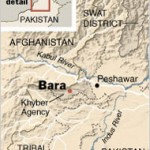Monday
Feb232009
Mr Obama's War: US Special Forces Training Pakistani Units, US Military Pressing Pakistani Allies
 Monday, February 23, 2009 at 6:24
Monday, February 23, 2009 at 6:24
Related Post: Josh Mull on "Mr Obama's War" in Afghanistan and Pakistan
Related Post: Ceasefire in NW Pakistan; More on US Drone Strikes
Related Post: Mr Obama's War - Expanding the Enemies in Pakistan
 The New York Times reports this morning, from US military sources, "More than 70 United States military advisers and technical specialists are secretly working in Pakistan to help its armed forces battle Al Qaeda and the Taliban in the country’s lawless tribal areas."
The New York Times reports this morning, from US military sources, "More than 70 United States military advisers and technical specialists are secretly working in Pakistan to help its armed forces battle Al Qaeda and the Taliban in the country’s lawless tribal areas."
The secret task force, overseen by US Central Command and Special Operations Command, was created last summer. The US military that the task force training and information from the CIA has helped a new Pakistani commando unit to kill or capture up to 60 militants, including at least five high-ranking commanders, since last July.
This, however, is only the headline story. Underneath is an effort by the US military to put pressure on Pakistan. The sources claim that the task force "was launched with the support of the Pakistani Government and military". However, the Pakistanis still are holding back from an all-out offensive against the insurgents:
It is no coincidence that Kayani is in Washington this week for the White House review on Afghanistan and Pakistan. He will be having direct meetings with Secretary of Defense Robert Gates and the US Joint Chief of Staff.
Bottom line? Expect more US-backed attacks on the military front against the bad guys and expect more psychological warfare against any Pakistani officials who appear reluctant to get on with the campaign, either by holding back on the battlefield or by offering political concessions to the local "Taliban" groups.
Related Post: Ceasefire in NW Pakistan; More on US Drone Strikes
Related Post: Mr Obama's War - Expanding the Enemies in Pakistan
 The New York Times reports this morning, from US military sources, "More than 70 United States military advisers and technical specialists are secretly working in Pakistan to help its armed forces battle Al Qaeda and the Taliban in the country’s lawless tribal areas."
The New York Times reports this morning, from US military sources, "More than 70 United States military advisers and technical specialists are secretly working in Pakistan to help its armed forces battle Al Qaeda and the Taliban in the country’s lawless tribal areas."The secret task force, overseen by US Central Command and Special Operations Command, was created last summer. The US military that the task force training and information from the CIA has helped a new Pakistani commando unit to kill or capture up to 60 militants, including at least five high-ranking commanders, since last July.
This, however, is only the headline story. Underneath is an effort by the US military to put pressure on Pakistan. The sources claim that the task force "was launched with the support of the Pakistani Government and military". However, the Pakistanis still are holding back from an all-out offensive against the insurgents:
The main commanders of the Pakistani Taliban, including its leader, Baitullah Mehsud, and its leader in the Swat region, Maulana Fazlullah, remain at large. And senior American military officials remain frustrated that they have been unable to persuade the chief of the Pakistani Army, Gen. Ashfaq Parvez Kayani, to embrace serious counterinsurgency training for the army itself....
The American officials acknowledge that at the very moment when Washington most needs Pakistan’s help, the greater tensions between Pakistan and India since the terrorist attacks in Mumbai last November have made the Pakistani Army less willing to shift its attention to the Qaeda and Taliban threat.
It is no coincidence that Kayani is in Washington this week for the White House review on Afghanistan and Pakistan. He will be having direct meetings with Secretary of Defense Robert Gates and the US Joint Chief of Staff.
Bottom line? Expect more US-backed attacks on the military front against the bad guys and expect more psychological warfare against any Pakistani officials who appear reluctant to get on with the campaign, either by holding back on the battlefield or by offering political concessions to the local "Taliban" groups.

 Saturday's New York Times offers confirmation
Saturday's New York Times offers confirmation